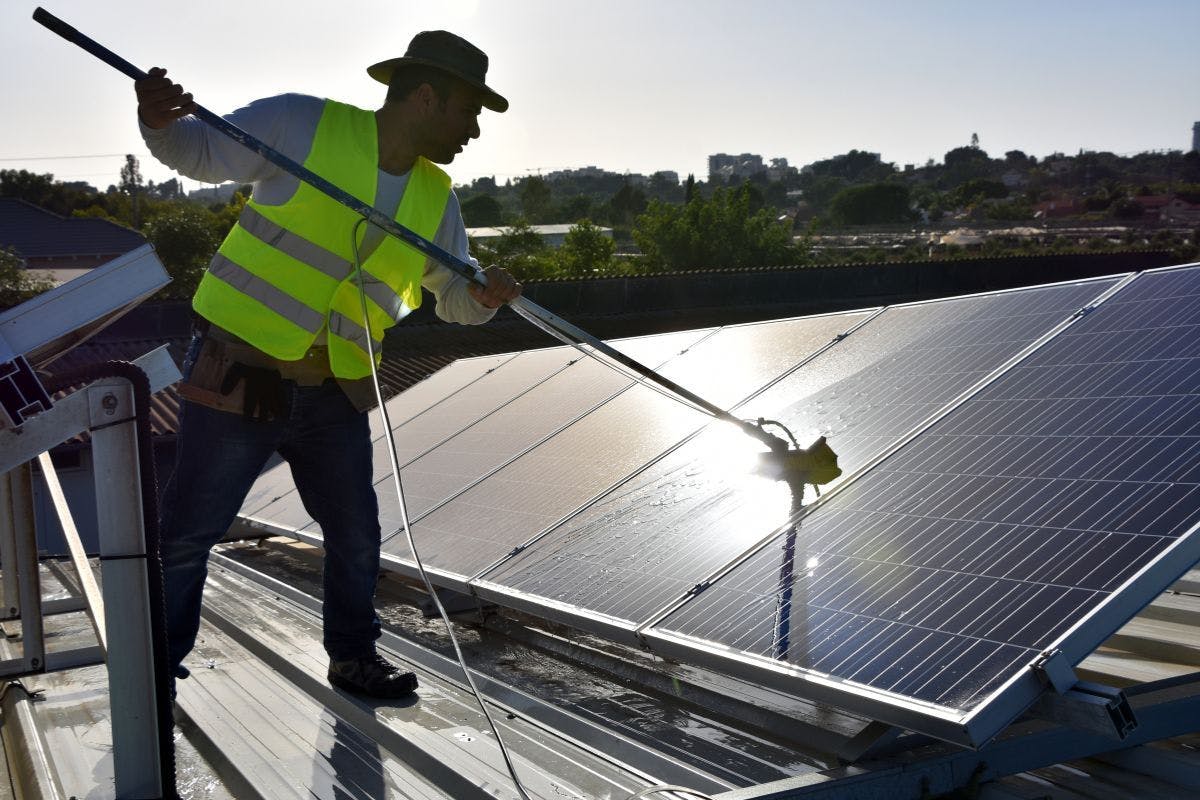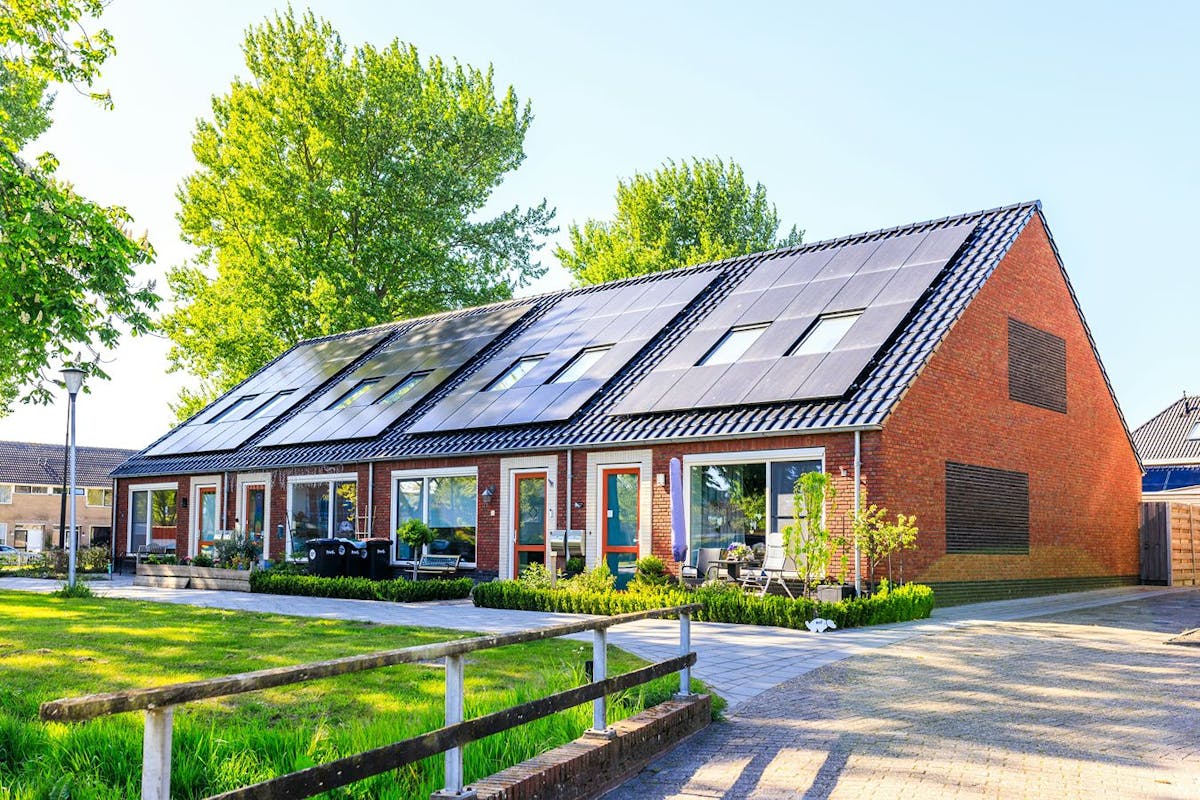Solar Panel Cleaning for Homeowners
Last edited

Author
Andrew Blok
Electrification and Solar Writer and Editor

Editor
Ryan Barnett
SVP, Policy & New Market Development

Solar panels turn sunlight into electricity. Anything that gets between them and the sun — clouds, trees, or buildings — can slow that process. Less sunlight in, less electricity out.
Dust and debris that settles on home solar panels can also depress performance. Cleaning them can help boost performance, but you might not need to do it as often as you think. Here’s what you need to know.
See how much you can save by going solar with Palmetto
How to Clean Solar Panels
If you’ve decided to clean your panels yourself, there is one crucial point: Stay safe and do not use any abrasive materials or tools. Avoid scratching or damaging the glass at all costs.
While you should check the manufacturer’s recommendations for your solar panels, you can follow these steps to clean most systems.
- Use a garden hose to initially wash away dust and other debris from your panels.
- Fill a bucket with clean, warm water and dish soap, as if you were going to wash your personal vehicle.
- Wipe away all soiling on your panels with a sponge or soft brush, but never touch any of the wiring or step on your panels.
- Use a squeegee to wipe away any dirty water.
For the best results, follow these tips from the solar experts at Palmetto.
- Solar panels can become very hot during the day, so it's best to clean panels in the morning or early evening.
- Avoid splashing cold water on a hot glass surface. It can lead to cracks.
- Never use strong cleaning fluids or harsh chemicals like laundry detergents, ammonia, or acids.
- Avoid climbing on the roof where you could damage your panels or hurt yourself.
If you don’t think you can effectively clean your panels while following those guidelines, it might be best to call in professional solar panel cleaners.
How Often Do I Need to Clean My Solar Panels?
You might not need to clean your panels, especially in places where it rains frequently. Besides a visual inspection, you can monitor your solar panels’ production. A decline in production might be a sign they need a cleaning.
In most cases, you need to clean your solar panels only once or twice per year. Schedule your annual cleaning routine during the spring. That avoids the heat of summer and harsh elements of winter.
Your solar panels might need extra attention in some locations. For example, panels can get extra dusty in the southwestern US because of limited rainfall. Also, panels in homes near airports, factories, freeways, and other sources of pollution may need more frequent cleaning.
Autumn and winter are other special cases. Removing leaves and heavy snowfall (though you should probably just let it melt) can boost your solar performance significantly.
What Causes Dirty Solar Panels?
Pretty much anything that can fall or float down from the sky and settle on your panels. Here’s some of the most common culprits.
- Bird droppings
- Dust
- Leaves
- Pollen
- Water stains
Do Solar Panels Need Cleaning?
Like anything that stays outside, solar panels will eventually accumulate dirt, dust, and other materials. How frequently you may have to wash your panels depends on several factors.
- System design: The exact location and spacing of your solar installation will affect how and when panels need to be cleaned.
- Installation angle: Steeper panel angles can reduce dust and debris build-up, while low-angle installations are more susceptible to soiling.
- Size/number of panels: Cleaning larger systems, with a greater surface area, will require more work.
- Location: Your location will help determine how often your panels need cleaning, with local pollution, pollen, and dust levels varying around the country.
- Types of build-up: The frequency and urgency for cleaning dirty solar panels depends on the severity of the build-up and how much light is being blocked.
- Weather: Dry locales without much rain or snow can necessitate greater cleaning frequencies, while rainier areas might get more frequent natural cleaning from the rain.
So, do solar panels need cleaning? Our definitive answer comes in three parts:
Answer #1: Yes, and you can do it yourself
Bird droppings and other soiling can affect your solar panel's performance. That's where washing the panels becomes important, though it doesn't have to be a thorough or routine cleaning in many cases.
Cleaning your solar panels is usually a relatively easy task. All you need to do is to spray the panels with average-pressure water from a well-angled garden hose while standing on the ground.
If you want extra cleaning power, a long-handled squeegee or soft brush plus a medium-pressure hose nozzle can work wonders.
This approach provides even more cleaning power, but it does depend on the angle of your roof, roof height, and panel placement, because not everyone will be able to reach their roof, even with a long handle. Again, never do anything that could scratch or crack your panels.
Answer #2: Yes, but you don’t need to do anything
Any regular wind and rain will typically wash off most of the dirt, so it can be best (and easiest!) to let nature take its course and only do one thorough cleaning every year to maximize energy production.
When it comes to doing any thorough cleaning and maintenance, it’s best to hire a professional with the knowledge and tools to get the job done safely and correctly the first time.
Answer #3: No, unless the soiling gets bad
Oftentimes, typical precipitation will be enough to clean off your panels and clear the path for sunlight again. You might not need to do anything.
If you have a solar lease, like one from Palmetto LightReach, typical soiling is likely built into the production estimates you received in your solar quote.
See how much you can save by going solar with Palmetto
Can Cleaning Solar Panels Improve the Performance of PV Systems?
An experiment involving solar panels on a low-slope roof sought out the difference in energy output before and after a thorough cleaning.
The researchers found an average 3.5% boost in energy production (the amount of power produced over time) after cleaning the panels using a soft rag and water. The energy yield increase was low, despite the high amount of dirt accumulation.
Things became interesting when heavy rain did the cleaning job. The average performance increased by only 1.9% after rainwater pounded on the dirty panels. What does that mean? A good shower from the skies can take care of some cleanup, but it’s not as effective as the proper equipment and some elbow grease.
You may want to check how much your dirty solar panels are costing you in terms of energy generation. Here's a simple formula for determining the value of solar panel cleaning:
Yearly Energy Production (kWh) × Production Loss From Dirty Panels × Electricity Cost per kWh
For example, if your residential solar energy system can produce 10,000 kWh of electricity per year, and you assume a 5% loss of production due to panels being dirty, and you pay $.20 cents per kWh for electricity from your utility, your yearly cost of electricity loss from dirty panels is as follows:
10,000 × .05 × .20 = $100
A 5% electricity production loss might not sound like a lot, but it can definitely add up, and suddenly you’re paying more to your utility company on your electricity bill than you need to be.
The science of cleaning your solar panels
Yes, rain helps wash solar panels and keep dirt at bay, but it comes with several downsides, which can lead to noticeable performance problems on panels set at low angles.
- Rainwater comes laden with pollen and dirt
- It can pool on the surface of your panels, especially if the glass surface sits lower than the frame
- Once the rainwater evaporates, it can leave behind a muddy residue
Researchers at a Google solar farm studied 1.6MW of horizontal solar panels on carports in Mountain View, California. These panels operated untouched for 15 months.
After cleaning them, the energy production from their carport solar panels doubled overnight! Eight months later, they cleaned those same solar panels and the output went up 36%.
So, what's our conclusion? Solar panels may need regular cleaning, especially if they're horizontal or almost horizontal on your roof. If yours are tilted appropriately, a reasonable amount of rainfall will get them mostly clean, but a scheduled annual visit from cleaning professionals may boost your overall renewable energy output.
Do I Need to Clean Off Snow From Solar Panels?
Heavy snowfall can make anyone nervous about their system not generating enough energy. However, snow on your solar power panels usually melts away quickly, thanks to the heat created by the solar panels, and their slick surface. Snow on a panel melts faster than on an empty roof.
You can find products for clearing snow off of solar panels, but we recommend letting the snow melt naturally. The benefit of a few hours or days of better solar production from removing the snow can easily be outweighed by years of lost production thanks to scratches or damaged panels.
Can I Use a Pressure Washer When Cleaning My Solar Panels?
Don’t do it. High-pressure water is among the biggest enemies of your solar equipment.
First, high-speed water can force its way through the seals around the frames and reach the sensitive electrical components of your panels. And, unlike even the heaviest rainfalls, high pressured water can crack the glass, spelling major problems for your solar panels.
What is Localized Soiling?
Localized soiling of solar panels is when material like bird poop, leaves, and any other heavy blockages get stuck on your panels, but only cover part of the panel. Compare that to general soiling, where material like dirt and dust covers the entire panel surface.
For older solar panels, this type of localized soiling can cause hot spots, a phenomenon that damages the solar panel in the longterm. Modern solar panels come with multiple built-in bypass diodes to keep hot spots at bay.
Key Takeaways
- It's understandable to want to clean solar panels to maximize their performance.
- It's good to pay attention to the condition of your solar panels.
- Be careful with how you clean them.
- Proper cleaning in the right context can improve the performance of your solar panels.
- Deep solar panel cleaning is best left to professionals like Palmetto that have the knowledge, experience, and equipment to get the job done safely the first time.
If you’re looking for cleaning or another solar panel service, see if Palmetto can help.
See what solar can do for you:
Frequently Asked Questions
How often do you need to clean solar panels?
The recommended frequency for cleaning solar panels depends primarily on local conditions, including the amount of annual precipitation and the levels of dust, pollen, pollution, and other airborne materials. In general, most solar panels need to be cleaned only once or twice a year or whenever system performance has noticeably dropped due to dirty surfaces.
Can I clean my solar panels myself?
Yes, you can clean solar panels yourself or you can hire a professional. If your solar panels are on your roof or in a hard to reach area, hiring a professional is recommended for your personal safety. With this in mind, a garden hose can sometimes do the trick between professional cleanings.
I live in a snowy area. Will solar panels work for me?
Yes, solar panels work in snowy areas. Although solar panels cannot produce electricity while covered in snow, snowfall can help clean solar panels by wiping away dust and debris. Further, light reflecting off of snow can also be absorbed by solar panels, leading to increased energy production in snowy conditions known as the albedo effect.


